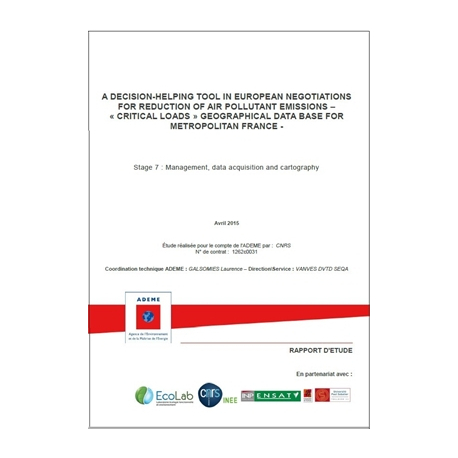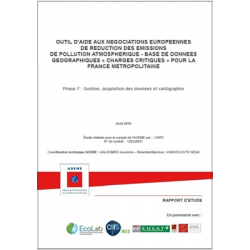 Agrandir l'image
Agrandir l'image
A decision-helping tool in European negotiations for reduction of air pollutant emissions
« Critical loads » Geographical data base for metropolitan France - Stage 7 -management, data acquisition and cartography
Neuf
The reduction of air pollutant emissions are discussed under the Geneva Convention on long-range transboundary air pollution. These international negotiations are based on the impact of atmospheric contaminants on ecosystem functions. To quantify these effects, the critical loads concept is used. A critical load geographical database (or BDGCC) was created in[…] Plus de détails
Fiche technique
| Auteurs | CNRS, ADEME |
| Public(s) | Secteur de la recherche |
| Administration publique | |
| Thématique | Air et bruit |
| Collection | Hors collection |
| Date d'édition | 2015/04 |
| Nb. de pages | 76 P |
| Format | pdf/A4 |
| Langue | EN |
| Périmètre de publication | National |
En savoir plus
The reduction of air pollutant emissions are discussed under the Geneva Convention on long-range transboundary air pollution. These international negotiations are based on the impact of atmospheric contaminants on ecosystem functions. To quantify these effects, the critical loads concept is used. A critical load geographical database (or BDGCC) was created in 1997 to manage the environmental data (soil, parent material, hydrology, vegetation, ecosystems) needed to spatially model the critical loads for the French territory. Since then, the structure and the content of the BDGCC have been regularly updated and increased in order to take into account new applications (in particular geographic information system) and needs in model input parameters. With this tool, updated maps of critical loads for different air pollutants have been regularly produced and data sent to the Coordination European Centre for critical load mapping (such as for forestry ecosystems). In this report, we present the work done to create a new version of the BDGCC on the French critical load on the ecosystems (in the framework of the EXBD2C-2 supported by the ADEME). The database has been reorganised within a new structure to integrate new data for biogeochemical and ecological dynamic modelling required at the European level. For that purpose, new tool improvements have been proposed, allowing distant requests and a didactic use.



